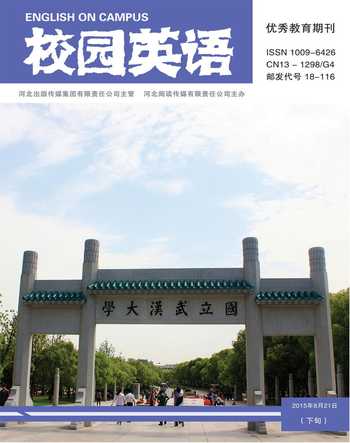Existentialism in“Waiting for Godot”
刘巍
【Abstract】The thesis interprets waiting for Godot through writings of Nietzsche and Camus on existentialism.Therefore,main characters in the play are created to illustrate the meaninglessness of existence.
【Key words】existentialism; waiting for Godot
Waiting for Godot,by Samuel Beckett,is an absurdist play in which two characters,Vladimir and Estragon,wait endlessly and in vain for the arrival of someone named Godot.
I.Introduction of existentialism
Existentialism is based on the broad idea that life contains no pre-determined meaning and that our awareness of this causes suffering.Nietzsche believes that the only way we can conceivably commit to existence,despite the pains of experience,is if we take part in the act of creation; that is,if we exist as artists who produce meaning out of this meaninglessness.Camus,inspired by Nietzsches words,takes his conception of absurdity,as well as his idea that Greek tragedy was composed of the Dionysian and Apollonian aspects of pagan mysticism,and use it to shape the characters of their plays.[1]Beckett combines Camus conception of absurdity and Nietzsches tragic poet in his composition.To this end,“The progress of an artist is a continual self-sacrifice,the continual extinction of personality”[2]in the effort of the playwright.
II.Analysis of the play
Since the play was shown in public,it did make Beckett famous.It inspired an abundance of critical comment,explanation and exegesis in a relatively short time.It became a contemporary classic.“Waiting for Godot” is a play about mans ontological struggle.Indeed,“The only certainty,” that Gogo and Didi know is the necessity of waiting:“Yes,in this immense confusion one thing alone is clear.We are waiting for Godot to come”.The predicament of man is the same as the one of existence.It is the particularly human sense that life is difficult,repetitive and in this,meaningless.
The play has two acts.The play itself is self-reflexive in its content.It can be understood as a play about the tension between two views of reality.To Didi and the audience,the second act seems to be a repetition of the first,but a repetition implies an original and a copy.The two acts are on an equal footing,representing parallel versions of the selfsame day.[3]
The play stresses that while the world is essentially empty,something that we do see and focus on,due to what we perceive as their phenomenological presence,often assume some deeper or abstract meaning.Essentially,we link the presence of these objects with our own presences.The setting in the play is simple,two men are waiting on a country road by a tree.The tree represents the life,which grows from a seed,fermented,to decay wherein the body becomes the earth,is able to die,then surely the tree must have meaning.Therefore,we proceed by finding or generating meaning in our surroundings,turning them into symbols.
III.Conclusion
The main characters Didi and Gogo are created to illustrate and emphasize the meaninglessness of existence,the absurdity that comes from the Camusian conflict.This conflict comes by the revolt of the individual against senselessness.This conflict,while represented in the characters of the play,comes out of the creator of the tragedy itself; because the theatre of the absurd is in core the modern tragedy.Beckett depends on this dualism to develop the possibilities of interpretation,and to show that symbolism comes out of our own recognition of parallels,juxtapositions,allusions and so on.God,by this measure,is created by men in the same way.Whether he does exist is irrelevant; he appears to us insofar as we make of him.Everyone,not just the creator of the play,is an artist and therefore has the potential to live authentically.
Reference:
[1]Arnold,A.(1973)“CamusDionysian Hero:“Caligula” in 1938.”South Atlantic Bulletin,Vol.38 (No.4)p.45-53.South Atlantic Modern Language Association.
[2]Eliot,T.(2003).“Tradition and the Individual Talent.” The Norton Anthology of Modern and Contemporary Poetry:Modern Poetry (Vol.1)(Eds.)Ramazani,J.,Ellmann,R.,OClaire,R.New York:Norton.
[3]Spector,D.(2008).“DISTINGUISHING THE MULTIVERSE FROM AN ECHO:Quantum Mechanics and “Waiting for Godot”.” Samuel Beckett Today/Aujourdhui,Vol.20.p.244-257.Editions Rodopi B.V.

